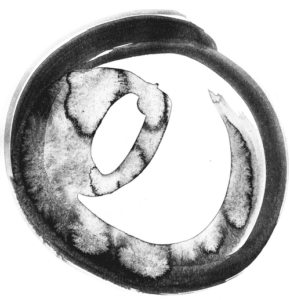Happiness is called Mycobacteriun vaccae and is a soil bacterium. Having contact with it is good for us humans in several ways. Mycobacterium vaccae belongs to the microorganisms that are sometimes called “old friend”.
As with all old friends, there is a story to tell…
You’re half bacteria
Once upon a time was a mammal that evolved into a human. This took a long time and took place at the same time as the development of other life forms, including microorganisms.
We know today that our body is home to millions of bacteria and that we could not live without them. They help us digest the food we eat, they protect us from pathogenic bacteria (the ones we can get sick from), they produce substances we need (like vitamin B12 for example), they affect our immune system and the list can be made even longer.
When talking about these “good” bacteria, many people think of the intestinal flora, which is quite right. But there is much more. Bacteria are absolutely everywhere on and in our body. It has been calculated that a human body contains about as many human cells as bacterial cells. Yes! You and I are half bacteria. No wonder they affect how our body works and can promote our health! Maybe it’s time to look at them as our friends and take care of them!
The old friend hypothesis
In our society, contact with microorganisms from the environment where we evolved has decreased drastically, especially in urban environments. This is linked to our lifestyle: cleanliness, unnecessary use of antibiotics, eating habits, indoor life… The modern human is losing more and more contact with his original environment: nature. This leads to known consequences on our physiological and psychological health. There is more and more talk about nature deficit disorder, which also includes our “old friends” bacteria.
What as soil to do with this?
As previously mentioned, we live with “our” bacteria on and in our body, but there are also those that we interact with for shorter periods. Those that are in the air and that we breathe in, on surfaces that we touch, on what we eat. An environment where there are millions of bacteria is the soil. One of these bacteria is Mycobacterium vaccae. This bacterium has interested researchers for many years due to its potential role in immunotherapy, to help with asthma, cancer, various skin diseases, but also for its effect on our well-being.
Dr. O’Brien is an oncologist and decided to investigate whether M. vaccae could help patients with lung cancer. In a study she led, half of the patients received chemotherapy treatment and injection of M. vaccae and half received only chemotherapy treatment. Unfortunately, the bacterium did not contribute to increased patient survival, but what Dr. O’Brien noticed was that patients who received the M. vaccae injection had better results on the variables that measured quality of life. Particularly large differences were noticed on emotional health and cognitive functions, but also for physical symptoms linked to cancer treatment (pain, nausea). Patients who received M. vaccae in addition to chemotherapy felt better!
These results interested other researchers and several studies were performed on mice. The behavior of the mice in a labyrinth was evaluated after they were exposed to stressful conditions. Researchers noticed that those who received injections of M. vaccae showed decreased behavior associated with anxiety or fear. This was linked to the activation of genes involved in serotonin response. Serotonin is a hormone that stabilizes the mood and promotes joy and well-being, but also affects our sleep and digestion. The study showed that injection of M. vaccae also prevented stress-induced intestinal inflammation.
In 2019, an article was published showing that M. vaccae produces a fatty acid that can induce anti-inflammatory reactions in cultured mouse cells.
What does all of this mean?
There is at least one bacterium in the soil that produces a substance (a fatty acid) that our cells are able to recognize and this contact leads to anti-inflammatory reactions in the body and increased well-being. In previous articles I have written about the “language of trees” (phytoncider) that we can understand and that can strengthen our immune system, and about natural patterns (fractals) that promote stress recovery when we look at them. We also communicate with the earth through bacteria that live there and we feel good about it. We are simply made to respond to the environment in which we have evolved. We are at home in nature.
So the next time you walk in the woods or work in the garden, take the chance to make contact with the soil. Earthy hands can make you happy!
Not only earth is good for you: to look at nature fractals or breathe trees phytoncides will make you well!
Some references
• Sender R, Fuchs S, Milo R. Are We Really Vastly Outnumbered? Revisiting the Ratio of Bacterial to Host Cells in Humans. Cell. 164 (3): 337-340.
• Langgartner D, Lowry CA, Reber SO. Old Friends, immunoregulation, and stress resilience. Pflugers Arch. 2019 Feb;471(2):237-269.
• O’Brien MER, Anderson H, Kaukel E, O’Byrne K, Pawlicki M, von Pawel J, Reck M. SRL172 (killed Mycobacterium vaccae) in addition to standard chemotherapy improves quality of life without affecting survival, in patients with advanced non-small-cell lung cancer: phase III results. Annals of Oncology 2004. 15: 906–914.
• Rebera SO, Siebler PH, Donner NC, Morton JT, Smith DG, Kopelman JM, Lowec KR, Wheeler KJ, Fox JH, Hassell Jr.JE, Greenwood BN, Jansch C, Lechner A, Schmidt D, Uschold-Schmidt N, Füchsl AM, Langgartner D, Walker FR, Hale MW, Lopez Perez G, Van Treuren W, González A, Halweg-Edward AL, Fleshner M , Raison CL, Rook GA, Peddada SD Knight R, Lowry CA. Immunization with a heat-killed preparation of the environmental bacterium Mycobacterium vaccae promotes stress resilience in mice. Proc Natl Acad Sci U S A. 2016. 113(22):E3130-9.
• Smith DG, Martinelli R, Besra GS, Illarionov PA, Szatmari I, Brazda P, Allen MA,Xu W, Wang X, Nagy L, Dowell RD, Rook GAW, Rosa Brunet L, Lowry CA. Identification and characterization of a novel anti-inflammatory lipid isolated from Mycobacterium vaccae, a soil-derived bacterium with immunoregulatory and stress resilience properties. Psychopharmacology (Berl). 2019. 236(5): 1653–1670.



